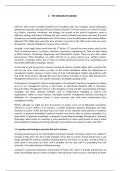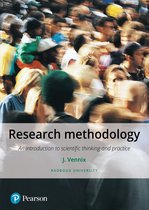1. THE ORIGINS OF SCIENCE
Until the 19th century scientific activities were classified under two headings: natural philosophy
(philosophia naturalis) and natural history (historia naturalis). The first focusses on science of nature
(e.g. physics, chemistry, astronomy, and biology), the second on the study of organisms, more in
particular zoology and botany. Although the term science (scientia) was known and used, the word
scientist was not widely applied before the 19th century. It was the philosopher and scientist William
Whewell (1794-1866) who coined the term scientist. It was also in the 19th century that new terms
like physicist, chemist, biologist etc. became more common.
Secondly, in the Anglo-Saxon world (from the 5 th till the 11th century) the word science refers to the
'hard' or natural sciences, i.e. physics, chemistry, astronomy, engineering etc. They are often noted
as STEM (Science, Technology, Engineering and Mathematics) studies. These are also often called
beta-sciences. Other disciplines are often referred to as social sciences (e.g. political science,
economics, sociology), which may or may not include behavioural sciences (e.g. psychology), and
humanities (philosophy, languages, history).
In this book we will use the term science to denote all sciences, whether alpha, beta or gamma. We
will use the term social science to refer to the various disciplines within the department of
management studies, because it shares many of their methodological insights and problems with
that of the social sciences, although the term social science is broader of course. Note that the term
Management Science has a very specific meaning in the English speaking world.
At first glance, Management Science would appear to be equivalent (equal) to management studies,
but it is not. Management Science is also known as Operational Research (UK) or Operations
Research (USA). Management Science: is the discipline of using scientific research-based principles,
strategies, and other analytical methods, such as mathematical modelling to improve any
organization's ability to enact rational, meaningful business management decisions according to
Wikipedia. So, Management Science is much narrower and much more mathematical than
management studies.
Thirdly, although we might say that all branches of science came out of philosophy (sometimes
referred to as the mother of all sciences), a marked distinction between philosophy and other
branches of science is that the latter focus very much on the empirical world and rely on empirical
research to generate knowledge. Empirical research very much relies on sensory perception, e.g.
observation, to generate knowledge as opposed to generating knowledge through pure reasoning.
Philosophy relies heavily on reasoning, is more speculative in nature and focusses on what is called
the foundations of knowing and being, although it also includes such subjects as logic, and ethics.
1.1 Learning and knowing in everyday life and in sciences
Knowing and learning are two interrelated (connected) concepts. All living creatures are capable of
learning. If they were not, they would probably not be able to survive. Human beings have a vast
(huge) potential for learning. Literally everything that we now know or can (do), we had to learn at
some point in time since our birth. And it probably will not stop with f.e. graduating from the
university, if we adopt the idea of lifelong learning.
Learning is a pervasive (extensive) characteristic of human life. And it is through learning that we
build up knowledge about a variety of subjects, both about the world around us and about ourselves
, (although the latter is frequently more difficult than the former). If you do not learn you will not
progress in life. This is also true for science and philosophy. However, you have also learned through
experience and through reasoning. Although these types of learning may seem straightforward, they
are in fact not. Many things can go wrong,
First of all our reasoning abilities. Unfortunately, in general people are not clear thinkers. Clear and
logical thinking is not given to most people naturally at birth. Clear thinking and argumentation is
rather the exception than the rule. It takes considerable effort and training to become better at it, an
effort that many people are not willing to invest (a university education is an excellent opportunity).
Many people are also under the impression that debate is a good way to learn: arguments are
exchanged, debated, the best argument will survive and everybody learns. Unfortunately that is
rarely the case, certainly not if emotions run high. And it becomes even worse when debaters are
surrounded by 'spectators' (toeschouwers).
In other words in this type of setting (a discussion with spectators), saving your face becomes often
more important than finding the truth. Typically what happens is that a very appealing fallacy
(misinterpretation) is used, i.e. 'argumentum ad hominem'. Rather than attacking an opponent's
argument, one attacks the person, e.g. the person's character, and by disgracing the person, the
argument is supposed to be discredited. The question is indeed whether debate is the best way to
learn.
Apart from our reasoning abilities, in order to be able to learn, one should be able to consult all
relevant information before forming an opinion on a topic. This is difficult for at least two reasons.
Firstly, there may just be too much information out there to consult. Unless you are an expert in that
subject area, you will not have the opportunity to consult all relevant information first hand. Instead
you rely on media coverage, which is generally tainted (spoiled), different news outlets typically
report on different subjects as well as different on the 'same' subjects.
Secondly, in consulting information it is well established (by empirical research) that humans suffer
from what is called 'selective perception'. For example Hastorf and Cantril (1954) found that after a
particular rough college football game between the Dartmouth Indians and the Princeton Tigers,
perceptions between students of both colleges differed significantly on such questions as whether
the game was clean and fair, or who started the rough play.
Or to give another example, Dearborn and Simon (1958) confronted research subjects (i.e. managers)
with a written fictitious case called the Castengo Steel Company Case and asked them to identify the
most pressing problem of the company. Even when each research subject had exactly the same
written information on the company, the researchers found widely different 'most important
problems'. The most pressing problem selected, tended to correspond with the type of manager. F.e.
marketing managers tended to select a marketing problem, while human resource managers
selected a human resource problem.
In addition to selective perception, we also suffer from what is called 'confirmation bias'.
Confirmation bias is the selective collection of evidence that supports one's point of view and
discarding (throws away) information which could refute one's opinion. Information that is contrary
to our beliefs is scrutinized (checked) more critically than information which is consistent with our
beliefs according to Gilovich (1991). In short information processing is almost never 'neutral'.
When it comes to learning from experience, there is also something like 'explaining things away' or
'rationalising' after the fact. People seem to be extremely good at coming up with ad hoc
explanations according to Gilovich (1991). For instance you expect things to happen, and when they
don't, it is not so difficult to come up with an explanation. So when you believe that when there is a






